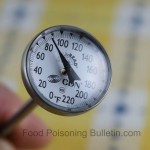The Harbor City Restaurant in Tippecanoe County, Indiana was closed by a court when the owner kept the restaurant open despite the health department's order to close. A county employee saw the owner, Peter Wang, loading food for delivery on July 7, 2016, two days after health inspectors closed the restaurant after an inspection July 5, 2016. That inspection revealed 21 critical food safety violations. Inspection reports for last year, which are available online, showed the restaurant has received repeated citations for critical violations, including cockroaches and maggots on the kitchen floor, blood and dry food on the shelf used to hang raw duck to drain after cleaning, and hazardous food maintained at too high a temperature. Other violations included a bucket with raw chicken … [Read more...]
Bakersfield Arby’s on Rosedale Closed for Rodent Infestation
Kern County officials have closed an Arby's outlet at 8920 Rosedale Highway in Bakersfield, California for rodent infestation. The restaurant received a score of 69%, which is a failing grade, for poor food handling practices and overall poor food establishment maintenance and sanitation. A complaint from the public triggered the latest inspection. The environmental health permit is suspended and a notice of closure is posted until the permit is reestablished. The restaurant must have a score of at least 80% before it can reopen. The inspection that forced the closure took place on June 29, 2016. The major violation is "Severe vermin infestation." Inspectors observed rodent droppings on the floor and boxes of soda syrup and other food related equipment in the dried storage area. … [Read more...]
Boston’s Fan Fan Restaurant Closed by Board of Health
Boston's Fan Fan Restaurant has been closed by the Board of Health for food safety violations. Eight of the twenty-seven cited violations are considered risky for critical foodborne illness. And two of the violations are considered critical. The critical violations included cooling food at room temperatures, holding chicken patties at 129°F, when the minimum hot holding temperature is 140°F, storing eggs above 41°F, and lack of pressure at the kitchen hand sink for hot and cold water. Other critical violations include inaccessible hand sink in cooking kitchen, and storing equipment in the hand sink during inspection. Finally, cans of Raid, a bug spray, were found in the food prep areas, and there was no allergen certificate. Critical violations included exterior grounds around the … [Read more...]
Hawaii Puts Restaurant Inspection Reports Online
The Hawaii State Department of Health now has Hawaii restaurant inspection information online. Consumers can now see food safety inspection reports with descriptions of violations. “We’re taking transparency to an entirely new level,” said Peter Oshiro, who manages the food safety inspection program. “Information from the inspection reports empowers consumers and informs their choices.” The online information is a companion to the Hawaii State Department of Health’s placard program developed in July 2014. The program gives restaurants green, yellow or red placards which must be posted so they are visible at the entrance of each location. Restaurants are fined for not posting them. “Data from the inspection reports give consumers the details behind the green, yellow or red … [Read more...]
Boston’s Chipotle Mexican Grill on Brookline Closed
The Boston Board of Health has posted that the Chipotle Mexican Grill at 144 Brookline Avenue in Boston, Massachusetts has been closed for critical foodborne illness violations. The inspection date is 7/10/2015. There were two critical violations and one non-critical violation. The first critical violation is for cold holding. The reach-in unit in the from is not working properly. Cheese and guacamole were held at 55°F (safe maximum temperature is 40°F.) The walk-in cooler is not working properly. The outside thermometer reads 59°F. The cheese was held at 60°F, raw steak at 52°F, raw chicken at 48°F, marinated chicken at 51°F, fully cooked barbecue at 55°F, fully cooked carnitas at a 52°F. Between 40°F and 140°F, bacteria can double in a food in 20 minutes. The second critical … [Read more...]
How Do Diners Use Restaurant Scores?
How do diners use restaurant scores? A Dine Safe study of usage in King County, Washington sheds some light. Many cities have adopted a grade policy for restaurants tool help customers decide where to eat. Some cities use letter grades. In New York, for example, restaurants are required to post the letter grade of their most recent health inspection where it can easily be seen by passers by. In Kansas, restaurants don’t have to post their grades, but a new online tool makes them available to consumers. The information provides a snapshot of conditions. In King County, Washington, Sarah Schacht, a member of the the Dine Safe stakeholder group, wanted to know more about how consumers use the information to make dining decisions. With the help of students from the University of … [Read more...]
Knott’s Berry Farm Restaurant Treated for Cockroaches
The restaurant called Mrs. Knott's Chicken Dinner Restaurant at Knott's Berry Farm in California was closed this week after cockroaches were found during a routine inspection. The permit for the establishment was restored Thursday, October 7, 2014 after treatment was completed. Officials at the park said the infestation was an "isolated structural incident" and was contained to utility areas in the restaurant. The restaurant was closed from 2:00 pm to 9:30 pm. Cockroach feces can cause allergic reactions and trigger serious asthma symptoms in some people. The insects can also carry pathogenic bacteria, including E. coli, Shigella, Cryptosporidium, and Salmonella, along with parasitic worms. They can also spread typhoid and dysentery. They eat fermenting products, glue, soiled … [Read more...]
Maggots in the Meat Case and Other Gross Food Safety Stories
Maggots in the meat case at a California Whole Foods store in Noe Valley is the news story that takes the top spot in this month's edition of the Neews, food safety stories that put the eew in news. A meat clerk, Marc Melancon, told KRON-4 news that there were 40 maggots in meat case when he arrived at about 2 pm on a Monday but the problem wasn't addressed until after the store closed that night. “It was pretty bad,” Melancon told the station. I could “actually see maggots underneath the plastic right near the meat that I was selling inside the case.” Store management told the San Francisco health department that only one dead maggot had been found, that it was not in contact with the meat and that the case was cleaned Monday, Tuesday and Friday, according to the news report. … [Read more...]
Vegas Chinese Restaurants Gamble With Food Safety
Food safety violations at Chinatown restaurants in Las Vegas have prompted a string of recent closures, according to a report from KTNV News. Many of them were for holding food at improper temperatures and storing or preparing food in dirty areas. Keeping hot foods hot and cold foods cold is a basic food safety principle. Cold foods need to be kept at or below 40˚ F and hot foods should be kept at 140˚F or above. Anything in between in considered the "danger zone," because bacteria such as Salmonella, E.coli and Campylobacter can double in number in as little as 20 minutes. On an April 22 inspection, Sam Woo BBQ had 51 demerits. Inspectors found the handwashing sink clogged with an opaque fluid; dirty floors, appliances and shelves; lots of food stored in the danger zone and spices … [Read more...]














